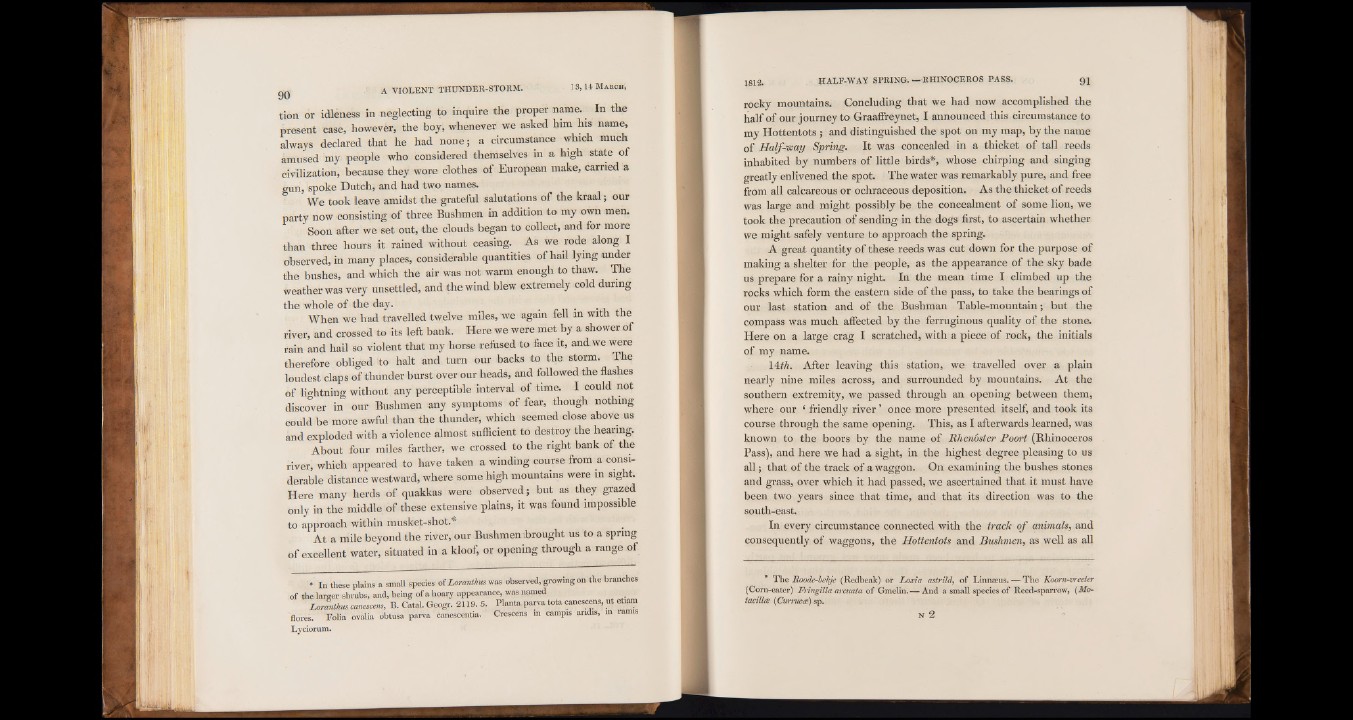
tion or idleness in neglecting to inquire the proper name. In the
present case, however, the boy, whenever we asked him his name,
always declared that he had none; a circumstance which much
amused my people who considered themselves in a high state of
civilization, because they wore clothes of European make, carried a
gun, spoke Dutch, and had two names.
We took leave amidst the grateful salutations of the kraal; our
party now consisting of three Bushmen in addition to my own men.
Soon after we set out, the clouds began to collect, and for more
than three hours it rained without ceasing. As we rode along I
observed, in many places, considerable quantities of hail lying under
the bushes, and which the air was not warm enough to thaw. The
weather was very unsettled, and the wind blew extremely cold during
the wWhohleen o wf eth hea dd atyr.a velled twelve miles, we again fell m wi#th the
river, and crossed to its left bank. Here we were met by a shower of
rain and hail so violent that my horse refused to face it, and we were
therefore obliged to halt and turn our backs to the storm. The
loudest claps of thunder burst over our heads, and followed the flashes
of lightning without any perceptible interval of time. I could not
discover in our Bushmen any symptoms of fear, though nothing
could be more awful than the thunder, which seemed close above us
and exploded with a violence almost sufficient to destroy the hearing.
About four miles farther, we crossed to the right bank of the
river, which appeared to have taken a winding course from a considerable
distance westward, where some high mountains were in sight.
Here many herds of quakkas were observed ; but as they grazed
only in the middle of these extensive plains, it was found impossible
to approach within musket-shot.*
At a mile beyond the river, our Bushmen ibrought us to a spring
of excellent water, situated in a kloof, or opening through a range of
to I„ these plains a small species of Laranthm was observed, growing on the brandies
of the larger shrubs, and, being of a hoary appearance, was named
LorantJms canescens, B. Catal.Geogr. 2119. S. Planta. parva tota canescens, ut etiam
flores. Folia ovalia bbtusa parva canescentia. Crescens in campis andis, in ramis
Lyciorum.
rocky mountains. Concluding that we had now accomplished the
half of our journey to Graaffreynet, I announced this circumstance to
my Hottentots ; and distinguished the spot on my map, by the name
of Half-way Spring. It was concealed in a thicket of tall reeds
inhabited by numbers of little birds*, whose chirping and singing
greatly enlivened the spot. The water was remarkably pure, and free
from all calcareous or ochraceous deposition. As the thicket of reeds
was large and might possibly be the concealment of some lion, we
took the precaution of sending in the dogs first, to ascertain whether
we might safely venture to approach the spring.
A great quantity of these reeds was cut down for the purpose of
making a shelter for the people, as the appearance of the sky bade
us prepare for a rainy night. In the mean time I climbed up the
rocks which form the eastern side of the pass, to take the bearings of
our last station and of the Bushman Table-mountain; but the
compass was much affected by the ferruginous quality of the stone.
Here on a large crag I scratched, with a piece of rock, the initials
of my name.
lith . After leaving this station, we travelled over a plain
nearly nine miles across, and surrounded by mountains. At the
southern extremity, we passed through an opening between them,
where our ‘ friendly river ’ once more presented itself, and took its
course through the same opening. This, as I afterwards learned, was
known to the boors by the name of Rhenoster Poort (Rhinoceros
Pass), and here we had a sight, in the highest degree pleasing to us
all; that of the track of a waggon. On examining the bushes stones
and grass, over which it had passed, we ascertained that it must have
been two years since that time, and that its direction was to the
south-east.
In every circumstance connected with the track of animals, and
consequently of waggons, the Hottentots and Bushmen, as well as all
* The JEtoode-beJcje (Redbeak) or Loxia astrild, of Linnaeus. — The Koom-vreeter
(Com-eater) Fringilla arcuata of Gmelin. — And a small species of Reed-sparrow, (Mo~
tacillce (Currucee) sp.